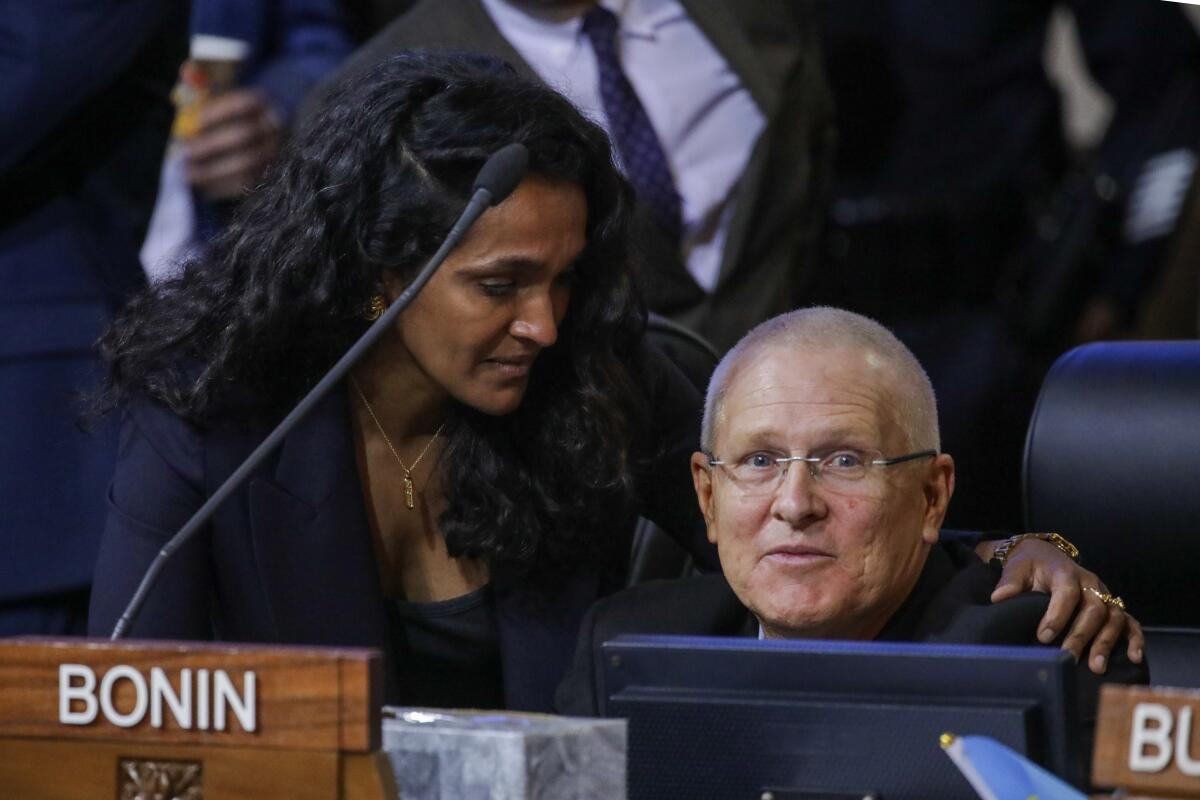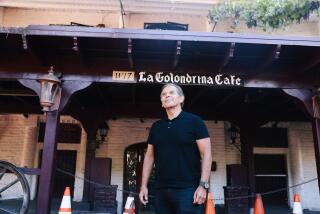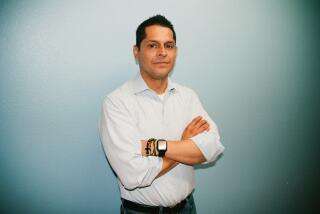Column: Bonin’s tearful speech was the best thing to come out of L.A. City Hall in ages

- Share via
Mike Bonin’s first attempt to speak was unsuccessful.
The boisterous crowd, enraged by one of the ugliest scandals ever to rock Los Angeles City Hall, demanded that there be no City Council meeting Tuesday without resignations first.
Bonin slumped back down, emotionally spent, just a few days after he learned that council President Nury Martinez had referred to his adopted Black son as a monkey. Martinez had proved herself to be an equal-opportunity offender, with unflattering remarks about Oaxacans, Black people, Jews and others.
At the meeting, several people wore T-shirts that said, “I’m with the Blacks,” a reference to Martinez’s criticism of L.A. Dist. Atty. George Gascón.
A few feet to Bonin’s left sat Councilmembers Gil Cedillo and Kevin De León, two of the three colleagues who had betrayed him. Cedillo and De León knew they had no choice as the crowd shouted for them to leave. So they walked out, looking as though they wished they’d put in for a leave of absence, like Martinez, their careers in flames.

L.A. City Councilmember Nury Martinez is taking a leave of absence amid outrage over racist comments she made on a leaked audio recording.
The departure quieted the crowd, and Bonin stood once more.
“I really, really don’t want to be here today. I want — I want to be home with my family right now,” said Bonin, fighting tears through a nearly 12-minute speech that was the best thing to come out of City Hall in ages.
True leaders know how to cheer and scold. They rally and summon the goodness and tolerance in all of us. Bonin did all of that — a gay dad reminding us that his colleagues’ petty, self-serving schemes had insulted a metropolis that, at its best, takes pride in its diversity.
“My husband and I are both raw and angry and heartbroken and sick — for our family and for Los Angeles,” he said. “I am reeling from the revelations of what these people said. Trusted servants who voiced hate and bile. Public officials are supposed to call us to our highest selves, and these people stabbed us and shot us and cut the spirit of Los Angeles.”
In the recording that was released over the weekend and has sparked days of outrage, Martinez said she’d seen Bonin’s son misbehaving on a parade float and in need of “a beatdown.” Labor leader Ron Herrera compared the child to a lawn jockey. De León suggested a comparison to an accessory, like one of Martinez’s handbags. The conversation took place a year ago, and mysteries remain about who recorded it and why it was released when it was.
As a politician, said Bonin — who has been a recall target largely over the entrenched homelessness in his district — you become used to taking hits.
“But my son?” he said. “Man, that makes my soul bleed, and it makes my temper burn. And I know I’m not alone. Because Los Angeles has spoken, and it feels the same way.”
Some of the offenders are asking forgiveness, Bonin said, and that’s “a good first step.” He got cheers when he backtracked and said, “But, well, it’s a second step. Because first, first you must resign and then ask forgiveness.”
There was both moral outrage and poetic grace in Bonin’s speech, and a look around the room offered hope of a silver lining in the rock-bottom, racially divisive ugliness that had brought everyone together. Black and brown people, equally offended, chanted together, demanding the ouster of the culprits.
I followed Bonin upstairs to his office after his speech. There’s a play area outside his door, because Bonin has encouraged staffers to bring their children to work at times. He said he used to bring his own son once a week when Herb Wesson was City Council president.
“I wanted him to see Wesson running the show,” Bonin told me. “I wanted him to see a face that looked like his. When you’re a white guy raising a Black kid, you know, there’s so much you’re unable to do and understand, so you try to bring him places to understand his heritage and history.”
Bonin slumped in a chair, still wrung out and wanting nothing more than to go home to his husband, Sean, and their 8½-year-old son. The boy knows nothing about the news, he said, and they are discussing how to explain it all to him.
Photos of the child hang on the wall, along with images of Bobby Kennedy and President Obama. A big photo of the boy shows him off the ground, arms splayed, leaping for joy, with a smile on his face.
Bonin, a Massachusetts native and former newspaper reporter, worked for a number of local politicians in Los Angeles. He once told me he had been addicted to alcohol and meth and had slept on the beach and in his car on occasion — experiences that made homelessness a focus for him.
He’ll be leaving office soon, having decided to work on his own mental health and spend more time with family rather than run for reelection.
Bonin had established himself as part of a growing leftward shift on City Council that sometimes put him at odds with more centrist colleagues.
“The split with Nury began to really become sort of a gaping fissure at the very start of the pandemic,” Bonin said.
Homelessness was a big part of that, with Bonin opposed to an anticamping ordinance that he saw as a tool of criminalization and a legal way to hustle people around the city without addressing their needs. He said he also disagreed with Martinez on renter protections and whether to hold meetings during the pandemic. (He was in favor.)
The recording that sparked the controversy was essentially a strategy session in which Martinez and colleagues discussed ways to carve out more power and representation for Latino communities. Bonin, in his council chambers speech, said the agenda included efforts to “disenfranchise Blacks and renters and to weaken the voice of progressives.”
The latest L.A. City Hall scandal, involving racist remarks, exposes the petty and hateful reality of failed leadership.
Bonin said he had heard a rumor that a tape, secretly recorded last year, would be released. That was confirmed when he attended a funeral in Boston over the weekend and got a call from Times reporter Ben Oreskes, filling him in on some of the more jaw-dropping details of what was said, especially by Martinez.
“There were parts of what she said that were utterly shocking, and there were parts that, knowing her, weren’t surprising at all,” Bonin told me.
“On these tapes,” Bonin said in his chambers speech, addressing a crowd that showed him love and shared his indignation, “I have heard the worst of what Los Angeles is. From you I am hearing and I am seeing what the best of Los Angeles is.”
He said, “This city is strong, and this city has a very big heart, and Los Angeles is going to heal.” As more young, diverse and progressive people move into office, he said, “I have more than hope” in the possibility of a city that grows into a real community. “I have faith that that can happen.”
In his office, Bonin told me he was sure about his decision earlier this year to wrap up his career, and the events of the last few days certainly haven’t shaken his resolve to spend more time with his husband and son. Just the opposite, in fact.
He was still stung by Martinez’s callous judgment of his son’s behavior at a parade, saying the lad wasn’t even 3 years old at the time and was just being a kid. He spoke briefly about the joys of fatherhood and, moments after I left his office, sent me a text, elaborating.
“Part of the reason it was so hard to answer is because it all feels like a joy. If pressed to pick a word to describe my son, Sean and I would absolutely say joyful. He is just a beautiful human. I want to emulate him. I want to be as joyful, kind, brave, strong and resilient as he is.
“He’s an amazing kid who loves life.”
More to Read
Sign up for Essential California
The most important California stories and recommendations in your inbox every morning.
You may occasionally receive promotional content from the Los Angeles Times.












